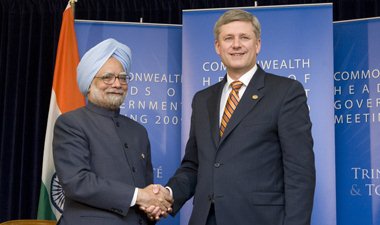 |
| Prime ministers Manmohan Singh and Stephen Harper |
Two weeks after Canadian prime minister Stephen Harper visited India, he and Indian prime minister Manmohan Singh have announced that they have struck a civilian nuclear cooperation agreement.
Closure of negotiations came in Trinidad & Tobago, where both men were participating in the 2009 Commonwealth Heads of Government Meeting.
Harper, who had received some criticism in the Canadian press for failing to close a deal on his Indian visit, said: "This agreement is a testimony to the undeniable potential that Canada and India can offer each other and the world. Increased collaboration with India's civilian nuclear energy market will allow Canadian companies to benefit from greater access to one of the world's largest and fastest expanding economies."
His office said Canada and India would now "now take the necessary steps to prepare the agreement for final signature and implementation." In Trinidad, Singh noted that talks had been intense after the Canadian visit, adding Harper and his officials had "expedited this process beyond my expectations."
As for the deal's details, a text has yet to be released. Mr Harper said the agreement would "allow Canadian firms to export and import controlled nuclear materials, equipment and technology to and from India."
Canada is a major exporter of uranium, while it can offer Candu pressurized heavy-water reactors through crown corporation Atomic Energy of Canada Ltd (AECL). India imported early Candus in the 1970s and went on to develop the design itself. Some 15 of the reactors are now in operation, with another achieving first criticality only last week.
Ala Alizadeh of AECL said: "The fact that we share the infrastructure gives us great optimism that we can work together." He looked forward to technology exchanges and
Climate change declaration The Commonwealth heads of government produced a joint statement ahead of this month's climate talks calling for a legally binding agreement to limit average temperature rise to 2ºC. |
cooperative work on reactor life extension and new builds. He argued that past concerns about non-proliferation and technology leaking into weapons programs were taken care of by India's commitments under its safeguards deal with the International Atomic Energy Agency, a related deal with the Nuclear Suppliers Group as well as a cooperation agreement with the USA. However, it is not yet known how these concerns have been written into the Canadian agreement. Trade relations spokesperson Me'shel Gulliver Bélanger said only that "Canada and India have legally bound themselves to develop full civil nuclear cooperation solely to promote the use of nuclear energy for peaceful purposes." Also noting India's IAEA agreements, she stressed: "The agreement pertains only to cooperation between Canada and civilian nuclear installations in India for as long as they are safeguarded by the IAEA."
In New Delhi, a senior official in the central government Department of Atomic Energy was also reluctant to give details. "It is a very happy moment that the agreement has been finalised," he said, "The prime minister has said that we have reached an understanding on the elements of the agreement, so we should not go beyond that and try hair splitting. It is to the satisfaction of the both countries."
However, a former Indian diplomat Arundhati Ghose was more candid. She said: "The political importance of the deal is much more than the issue of trade. Our current reactor designs are our own but the basic design were the Candus, which were the Canadian ones." While India was isolated from international nuclear trade it had no access to Canadian equipment or maintenance services and so was forced to devise its own methods, she stressed, a market which Canada is interested in securing. "India would like to access large uranium reserves of Canada, and they would like to have our technologies on Candu reactors."
Furthermore, the political signal of striking a deal with Canada internationally is important stressed Ghose, because "it the major country among 'non-nuclear' [weapon] nation states" backing international non-proliferation. She saw this as important ahead of the 2010 review of the Nuclear non-Proliferation Treaty. "It is a win-win situation on nuclear trade and commerce," she said.






_15863.jpg)







